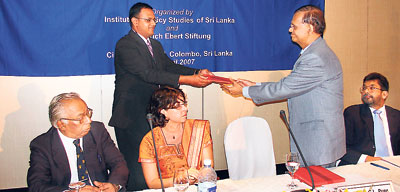
Service liberalisation on its way to South Asia
It’s coming Sri Lanka and India for instance, are already trying to open up service markets. India also signed an agreement with Singapore in 2005 to eventually open up 126 service categories to Singaporean competition. “Under the Singapore-India Comprehensive Economic Cooperation Agreement (CECA) we have agreed to develop mutual recognition agreements for 126 professions. This will allow our people to work in Singapore and will allow Singaporeans to work in India,” said Professor Rupa Chanda from the Indian Institute of Management, Bangalore. Mutual recognition agreements allow corresponding service categories in different countries recognise each other’s qualifications. “India is also in the process of including service chapters in already negotiated agreements such as with Sri Lanka and Thailand and with BIMSTEC (The Bay of Bengal Initiative for Multi Sectoral Technical and Economic Cooperation),” said Chanda. While India’s labour force is big enough to hold its own against foreign competition, even smaller countries in the region can’t avoid the subject. “The SAFTA (South Asia Free Trade Agreement) Ministerial Council Meeting in April 2006, assigned the Committee of Experts to produce a report on the feasibility of incorporating services in the SAFTA framework and to provide recommendations. So already, services are in the SAARC agenda. Given this situation there is a need to sensitise people before it comes into operation. People have to be made aware that service liberalisation is on the way,” said Kelegama. Just misunderstood Some services are already competing with foreign service providers. For instance in Sri Lanka, local banks are competing with, and holding their own, against foreign banks. Opening up more service sectors is expected to boost industry growth and benefit local consumers.“More players in a particular service area mean more competition. So prices will come down, whether it is a professional service or any other service. So depriving the services sector of the benefits of liberalisation comes with an increasing opportunity cost,” said Kelegama. Balancing act But this balancing act is more difficult in the South Asian region than the developed west. The main reason is the lack of data on services, their operations and impacts on labour markets and national economies. Without enough data, it is difficult to work out liberalisation strategies that would maximise benefits while minimising damages.“One reason we are not prepared for opening up of services is because we don’t have enough data. Without the data we can’t do various economic modelling to see the impacts of liberalisation. So it is difficult to predict what would be the results of liberalisations and to give the most suitable recommendations for each situation,” says Chanda. Disorganised service sectors add to complications. Most service sectors in South Asian countries do not have regulatory frameworks that set down service standards. This makes it difficult to ensure uniform quality of services from both local and foreign service providers. Consumers are also not organised in consumer groups to give inputs to governments and trade negotiators. Given this ground situation, economists are calling for better coordination between trade negotiators, service providers and other stakeholders, to get the best out of services liberalisation. Service providers in particular are advised to look sharp about putting their end of the business in order. |
| || Front
Page | News
| Editorial
| Columns
| Sports
| Plus
| Financial
Times | International
| Mirror
| TV
Times | Funday Times | ST - 1 || |
| |
Copyright
2007 Wijeya
Newspapers Ltd.Colombo. Sri Lanka. |
